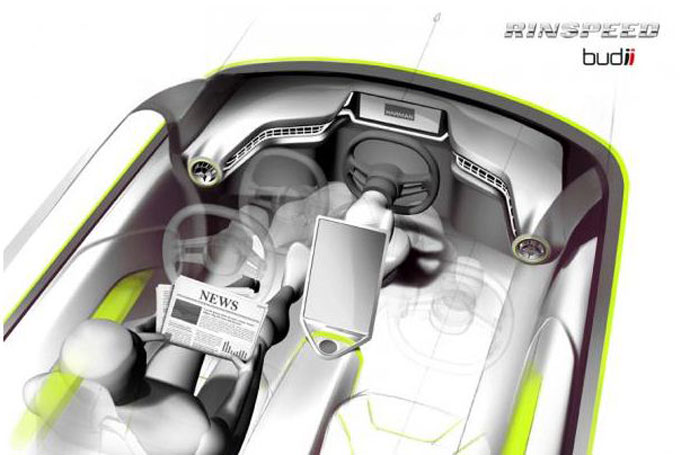The advent of autonomous cars has the potential to reduce congestion, emissions, fuel costs and, most importantly, road deaths – the World Health Organisation estimates that over one million people are killed each year on the roads. The idea of using driverless ‘crash-proof’ cars to address these problems might seem fanciful, but the most significant barrier to their successful introduction is likely to be cultural rather than technological.

Reading a newspaper at the wheel: More relaxing for you and safer for others
The lightning speed of recent technical developments has enabled prototypes, including the Google car, to cover hundreds of thousands of kilometres in ‘driverless’ mode – advances that not only promise safer roads, but force us to redefine our relationship with the automobile.
According to the founder of Swiss car company Rinspeed, Frank Rinderknech,: “Until now, what we have primarily associated with auto mobility was freedom and individuality. And – consciously or unconsciously – we are prepared to pay a high price in many regards for these privileges. We need only look at the accident statistics.”
There is a sense of inevitability about a change to autonomous driving, but any such change is likely to be gradual. Britain’s most popular car, the Ford Focus, is now offered with a self-parking feature – an optional extra that takes control of the steering to execute a perfect parallel park – but taking an entirely passive role for the entirety of a journey represents a seismic change in our relationship with our cars.
Artificial intelligence in cars
Artificial intelligence (AI) may enable the next generation of cars to learn how to best negotiate busy streets. Incidentally, although such cars promise to reduce road danger, they may bring with an altogether new risk. In an interview following the launch last week of software designed to help him communicate more easily, Stephen Hawking said that self-learning artificial intelligence, left to develop unimpeded, poses a risk to the survival of humanity.
Others are less gloomy about AI and an automotive application of the technology by Rinspeed at the Geneva Motor Show next year, is seemingly benign as it places the human firmly in command.
The Budii concept car boasts an autopilot feature that quickly learns the habits and preferences of its ‘boss’. The steering wheel is supported by a robotic arm, which enables either the driver or the front passenger to steer. When the wheel is parked in its centre position, the car drives itself.
According to Rinspeed, this hybrid driverless car will give motorists time to adjust to the new technology: “The transition from traditional to autonomous driving will take place in stages. Consequently, man and machine will still have a few years left to get used to this new form of mobility and the different interplay between people and technology it will entail, time they both will need.”
Road traffic collisions are the number one cause of death globally among those aged 15-29 years – in the time it has taken you to read this article, four people have been killed on the roads. If autonomous car technology can bring an end to this carnage, it cannot come soon enough.
ETA breakdown cover
Established 24 years ago, and with over 5,000 recovery trucks on call 24/7, the ETA has a proven track record of providing efficient, reliable breakdown cover. We handpick only the best local mechanics and garages around Britain to send out if you break down. We believe this way of working is efficient, environmentally friendly and helps support local communities and economies, too.
Ihshan
Driverless car may be the solution. However, with every program you must discover the route of development.
DRAPA was the first company to design this particular mode of transport. And when the military is involved you must consider the risk.
The programming of these vehicle lead to far more questions then solutions.